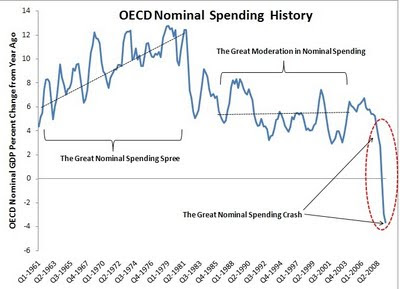Now that things have slowed down a bit, regular posting should resume. There's been a lot going on in the past few weeks, but I'm going to let most of it pass since I'm late to the party.
In a recent e-mail, Dr. Oatley mentioned that he thought that my regular postings on financial regulation were somewhat missing the point: the real blame for the economic crisis lies with the large external imbalances that have been building over the past decade. Even though I think that regulatory regimes are interesting and important, I think Dr. Oatley is exactly right to emphasize macroeconomic factors. So I was interested to read ECB Executive Board member Lorenzo Bini Smaghi's recent take on the same topic:
A strengthening of the IMF was agreed after the Asian crisis in the 1990’s, and the G-7 summit in Cologne in 1999 mandated the Fund to play a strong surveillance role to ensure greater transparency and encourage early adjustment by countries with unsustainable balance-of-payments positions.
But, over the last decade, the expectations raised by this mandate have not been met. Some emerging economies did not let their currencies float but, instead, continued to peg them at undervalued exchange rates in order to promote their exports and build up reserves as a form of insurance in case of crisis.
Moreover, the IMF has not succeeded in convincing countries to pursue macroeconomic policies consistent with sustainable current-account positions. Nor have advanced economies, particularly the United States, taken IMF advice fully into consideration. The accumulation of large surpluses, especially in emerging Asian economies and oil-exporting countries, enabled the US to finance its current-account deficit. It also lowered long-term interest rates in the US and made monetary conditions there more expansionary.
In the context of this testy exchange, "some emerging economies" can only mean China. And I suppose it's not surprising that an ECB official would deflect blame from EU countries despite the fact that Germany, for example, also ran large current account surpluses in the run-up to the crisis.
But is it right to criticize the IMF for not succeeding "in convincing countries to pursue macroeconomic policies consistent with sustainable current-account positions"? Not really. Until a crisis hits, the IMF is basically powerless. It can monitor behaviors and help boost transparency, but it has little formal authority to coerce states into allowing their currencies to float, say. How exactly is the IMF supposed to "convince" states to stop acting in their own self-interest? Smaghi doesn't provide an answer, but doesn't see much help coming from multilateralism, arguing that emerging economies that want a larger role in the IMF mostly want to weaken conditionality while increasing access to cheap credit.
Gee, it almost sounds like the global economy needs maintenance from a strong state. But Smaghi never proposes that Europe step into the breach. Actually, he never mentions Europe, or even a single European country, at all. Instead, the U.S. and China are somehow expected to voluntarily cede authority to the IMF while eschewing domestic political concerns to bring their current and capital accounts into balance. Well, color me skeptical.
Interestingly enough, the quickest, easiest feasible way to moderate imbalances is a higher peg for the yuan against the dollar. But this isn't necessarily something that Europe would like to see. So if the U.S. and China act more prudently, it may come at the expense of the Eurozone. What would Smaghi say then?



